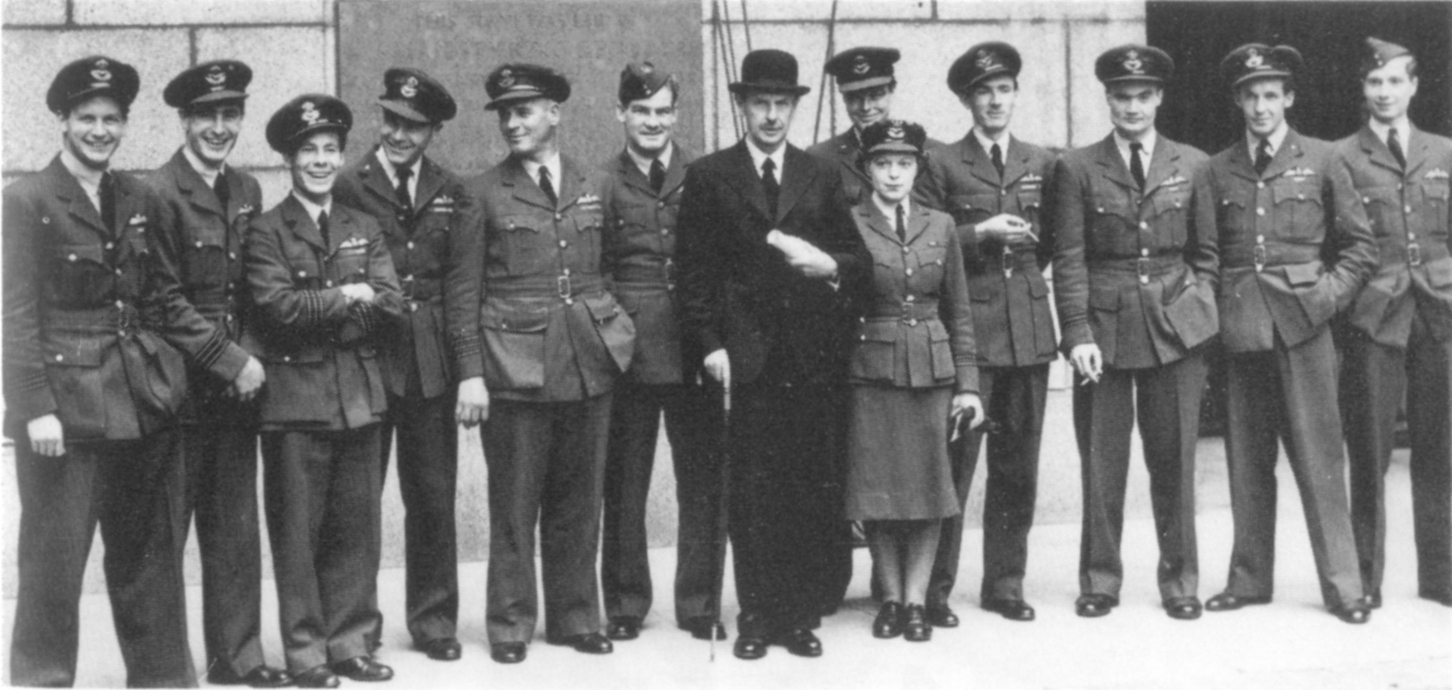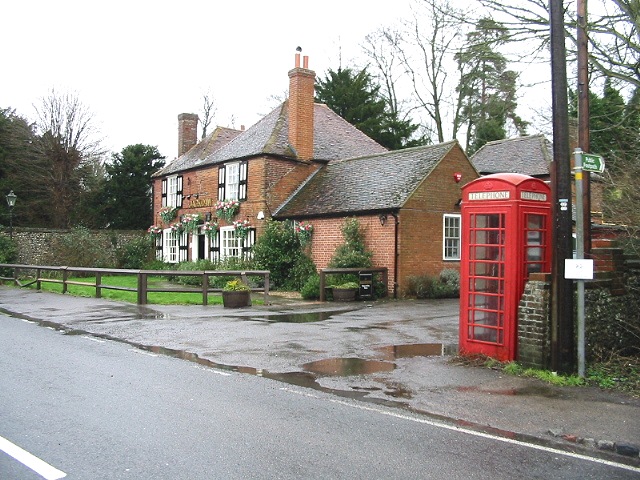|
Bolesław Drobiński
Bolesław Drobiński (23 October 191826 July 1995) was a Polish fighter ace of the Polish Air Force in World War II with 7 confirmed kills and one shared. Biography Drobiński made his first flight on a glider in 1934. On 2 January 1938 he entered the Polish Air Force Academy in Dęblin.Pawlak 2009, p. 231. After the Invasion of Poland he was evacuated to France via Romania and Italy, then he came to England.Krzystek 2012, p. 161. On 11 September 1940 Drobiński was assigned to the No. 65 Squadron RAF and took part in the Battle of Britain.Sikora 2014, p. 283. On 2 March 1941 he was posted to the No. 303 Polish Fighter Squadron. On 15 May 1941 he damaged a Ju 52 which was on the ground. On 21 June 1941 Drobiński heavily damaged the plane flown by German ace Adolf Galland and forced him to a crash-landing. From 18 March 1942 to 9 August 1942 he was an instructor in No. 58 Operational Training Unit at RAF Grangemouth.Zieliński 1994, p. 43. On 18 October 1943 he was ord ... [...More Info...] [...Related Items...] OR: [Wikipedia] [Google] [Baidu] |
Major (rank)
Major (commandant in certain jurisdictions) is a military rank of commissioned officer status, with corresponding ranks existing in many military forces throughout the world. When used unhyphenated and in conjunction with no other indicators, major is one rank above captain, and one rank below lieutenant colonel. It is considered the most junior of the field officer ranks. Background Majors are typically assigned as specialised executive or operations officers for battalion-sized units of 300 to 1,200 soldiers while in some nations, like Germany, majors are often in command of a company. When used in hyphenated or combined fashion, the term can also imply seniority at other levels of rank, including ''general-major'' or ''major general'', denoting a low-level general officer, and ''sergeant major'', denoting the most senior non-commissioned officer (NCO) of a military unit. The term ''major'' can also be used with a hyphen to denote the leader of a military band such as ... [...More Info...] [...Related Items...] OR: [Wikipedia] [Google] [Baidu] |
Battle Of Britain
The Battle of Britain, also known as the Air Battle for England (german: die Luftschlacht um England), was a military campaign of the Second World War, in which the Royal Air Force (RAF) and the Fleet Air Arm (FAA) of the Royal Navy defended the United Kingdom (UK) against large-scale attacks by Nazi Germany's air force, the Luftwaffe. It was the first major military campaign fought entirely by air forces."92 Squadron – Geoffrey Wellum." ''Battle of Britain Memorial Flight'' via ''raf.mod.uk.''. Retrieved: 17 November 2010, archived 2 March 2009. The British officially recognise the battle's duration as being from 10 July until 31 October 1940, which overlaps the period of large-scale night attacks known as |
Polish World War II Flying Aces
Polish may refer to: * Anything from or related to Poland, a country in Europe * Polish language * Poles, people from Poland or of Polish descent * Polish chicken *Polish brothers (Mark Polish and Michael Polish, born 1970), American twin screenwriters Polish may refer to: * Polishing, the process of creating a smooth and shiny surface by rubbing or chemical action ** French polishing, polishing wood to a high gloss finish * Nail polish Nail polish (also known as nail varnish or nail enamel) is a lacquer that can be applied to the human fingernail or toenails to decorate and protect the nail plates. The formula has been revised repeatedly to enhance its decorative properties ... * Shoe polish * Polish (screenwriting), improving a script in smaller ways than in a rewrite See also * * * Polonaise (other) {{Disambiguation, surname Language and nationality disambiguation pages ... [...More Info...] [...Related Items...] OR: [Wikipedia] [Google] [Baidu] |
The Few
The Few were the airmen of the Royal Air Force (RAF) and the aviators of the Fleet Air Arm, Royal Navy (RN) who fought the Battle of Britain in the Second World War. The term comes from Winston Churchill's phrase "Never was so much owed by so many to so few, Never, in the field of human conflict, was so much owed by so many to so few." It also alludes to Shakespeare's famous speech in his play, ''Henry V (play), Henry V'': "We few, we happy few, we band of brothers..." Aircrew Nearly 3,000 men were awarded the 1939–45 Star#Clasps, "Battle of Britain" clasp. As six of the seven longest surviving veterans of the battle (Squadron Leader John Hart (RAF officer), John Hart, Flight Lieutenant Archie McInnes, Flight Lieutenant Maurice Mounsdon, Air Vice-Marshal John Thornett Lawrence, Wing Commander Paul Farnes and Flight Lieutenant William Clark (RAF Officer), William Clark) died between June 2019 and May 2020 as of 8 May 2020, only one survivor of The Few is still living (Flying O ... [...More Info...] [...Related Items...] OR: [Wikipedia] [Google] [Baidu] |
Distinguished Flying Cross (United Kingdom)
The Distinguished Flying Cross (DFC) is the third-level military decoration awarded to officers, and since 1993 to other ranks, of the United Kingdom's Royal Air Force and other services, and formerly to officers of other Commonwealth countries, for "an act or acts of valour, courage or devotion to duty whilst flying in active operations against the enemy". History The award was established on 3 June 1918, shortly after the formation of the Royal Air Force (RAF), with the Royal Warrant published on 5 December 1919. It was originally awarded to RAF commissioned and warrant officers, including officers in Commonwealth and allied forces. In March 1941 eligibility was extended to Naval Officers of the Fleet Air Arm, and in November 1942 to Army officers, including Royal Artillery officers serving on attachment to the RAF as pilots-cum-artillery observers. Posthumous awards were permitted from 1979. Since the 1993 review of the honours system as part of the drive to remove disti ... [...More Info...] [...Related Items...] OR: [Wikipedia] [Google] [Baidu] |
Battle Of Britain (film)
''Battle of Britain'' is a 1969 British war film directed by Guy Hamilton, and produced by Harry Saltzman and S. Benjamin Fisz. The film documents the events of the Battle of Britain. The film drew many respected British actors to accept roles as key figures of the battle, including Laurence Olivier as Air Chief Marshal Sir Hugh Dowding, Trevor Howard as Air Vice-Marshal Keith Park, and Patrick Wymark as Air Vice-Marshal Trafford Leigh-Mallory. It also starred Michael Caine, Christopher Plummer, and Robert Shaw as Squadron Leaders. The script by James Kennaway and Wilfred Greatorex was based on the book ''The Narrow Margin'' by Derek Wood and Derek Dempster. The film endeavoured to be an accurate account of the Battle of Britain, when in the summer and autumn of 1940 the British RAF inflicted a strategic defeat on the ''Luftwaffe'' and so ensured the cancellation of Operation Sea Lion, Adolf Hitler's plan to invade Britain. The film is notable for its spectacular flying se ... [...More Info...] [...Related Items...] OR: [Wikipedia] [Google] [Baidu] |
Surrey
Surrey () is a ceremonial and non-metropolitan county in South East England, bordering Greater London to the south west. Surrey has a large rural area, and several significant urban areas which form part of the Greater London Built-up Area. With a population of approximately 1.2 million people, Surrey is the 12th-most populous county in England. The most populated town in Surrey is Woking, followed by Guildford. The county is divided into eleven districts with borough status. Between 1893 and 2020, Surrey County Council was headquartered at County Hall, Kingston-upon-Thames (now part of Greater London) but is now based at Woodhatch Place, Reigate. In the 20th century several alterations were made to Surrey's borders, with territory ceded to Greater London upon its creation and some gained from the abolition of Middlesex. Surrey is bordered by Greater London to the north east, Kent to the east, Berkshire to the north west, West Sussex to the south, East Sussex to ... [...More Info...] [...Related Items...] OR: [Wikipedia] [Google] [Baidu] |



